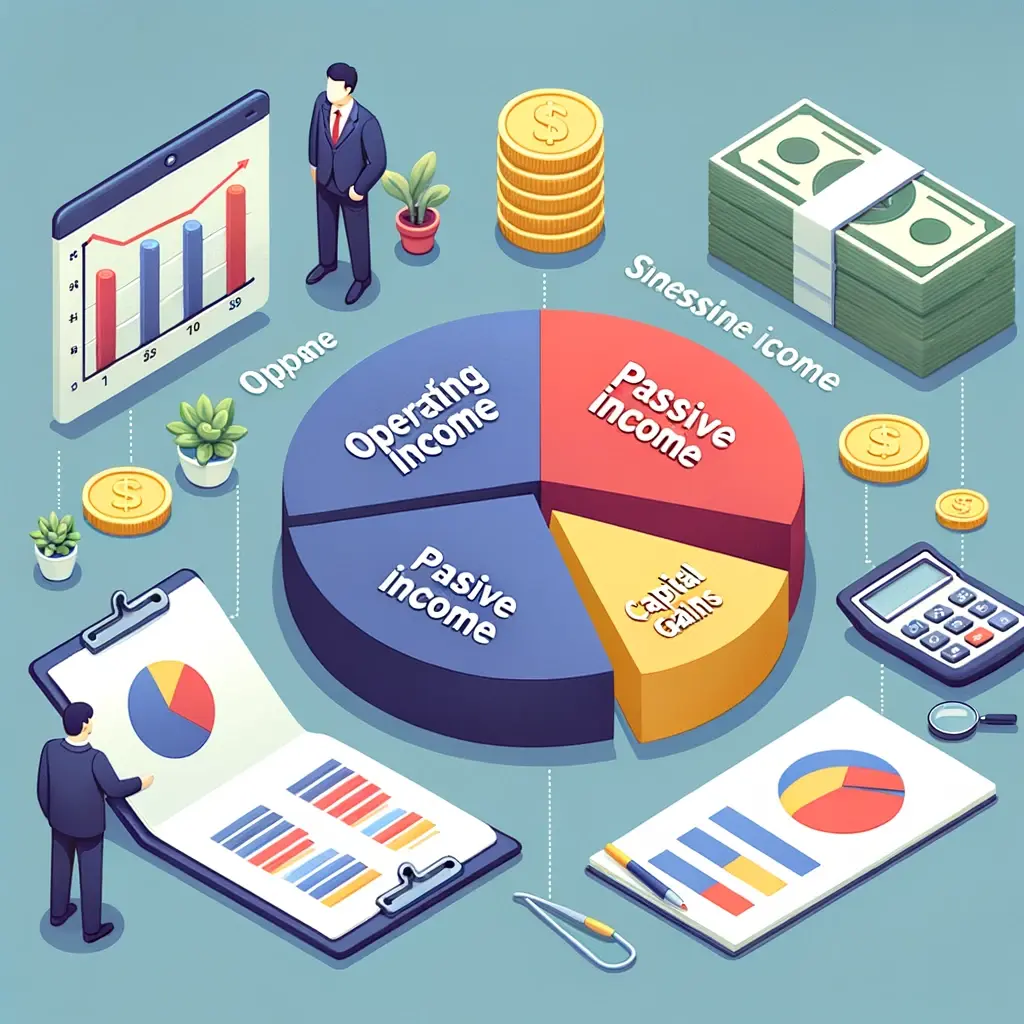Table of Contents

Introduction to Year-End Tax Planning
Navigating the intricacies of tax season is a daunting yet vital task for entrepreneurs. As the year draws to a close, proactive tax planning emerges not just as an administrative necessity but as a strategic tool. For business leaders, effectively planning can mean the difference between capitalizing on potential tax savings and incurring unnecessary tax liabilities. This guide aims to shed light on the fundamental aspects of year-end tax planning, equipping entrepreneurs with knowledge and strategies to optimize their tax positions.
Understanding Business Income and Its Implications
Every business, irrespective of its size or industry, has diverse income streams. These can be categorized into:
· Operating Income: This is the primary income generated from the core activities of a business. For a retailer, it would be sales revenue; for a service provider, it would be service fees.
· Passive Income: Income derived from endeavors in which the business isn’t actively involved. This includes interests from savings, dividends, or rental income if the company owns property.
· Capital Gains: Profits from the sale of a business asset, be it real estate, machinery, or even stocks and bonds, fall under this category.
Influences on Tax Liability
Different forms of business income are taxed differently, impacting the overall tax liability:
· Operating Income: It’s the most straightforward and is taxed based on the company’s total revenue minus deductible business expenses.
· Passive Income: Often subject to its own set of tax rates. For instance, dividend income may be taxed at a different rate than regular business income.
· Capital Gains: Typically, long-term capital gains (from assets held for over a year) are taxed at a more favorable rate compared to short-term gains. This distinction can significantly influence tax planning strategies, especially when considering the sale of business assets.
By gaining a comprehensive understanding of these income streams and their tax implications, entrepreneurs can effectively strategize to minimize their tax liability and enhance their business’s bottom line.

The Right Business Structure: A Foundation for Tax Savings
Every entrepreneur stands at a crossroad when choosing the appropriate business structure for their venture. Each structure comes with its own set of legal, financial, and tax implications:
· Sole Proprietorship: The simplest form, where the business and the owner are legally the same entity. Income and losses are reported on the owner’s personal tax returns.
· Partnership: A collaboration between two or more individuals. Profits and losses pass through to the partners and are reported on their personal income taxes.
· LLC (Limited Liability Company): Offers liability protection to its owners (called members) and can choose how they want to be taxed: like a sole proprietorship, partnership, or corporation.
· Corporation (C-Corp): A separate legal entity that pays its own corporate taxes on profits. Shareholders, when receiving dividends, face double taxation as they also pay taxes on these dividends.
Implications on Tax Obligations and Rate
· Sole Proprietorship: Earnings are subject to self-employment taxes. The tax rate is based on individual tax brackets, and there’s no distinction between personal and business income.
· Partnership: Partners are taxed on their share of the business’s income. Like sole proprietorships, the tax rate is determined by individual tax brackets.
· LLC: Tax implications vary based on the chosen taxation method. By default, they mirror sole proprietorships or partnerships, but can also opt for corporate taxation.
· Corporation: Subject to corporate tax rates. Shareholders face potential double taxation on dividends. However, strategies like salary disbursement can mitigate this.
Understanding the nuances of each structure is paramount, a sit forms the foundation for potential tax savings and determines overall tax obligations.

The Role of Financial Advisors and Tax Professionals
With a labyrinth of tax codes, laws, and implications, even the most seasoned entrepreneurs can find themselves overwhelmed. This is where financial advisors and tax professionals step in. Their expertise can illuminate the path, ensuring that businesses aren’t just compliant but also optimized for tax savings.
· Strategic Insight: Financial advisors can offer holistic advice that considers the entire financial picture, from investments to cash flow. They can help businesses align their financial goals with tax planning strategies.
· Complexity Simplified: Tax laws are intricate and constantly evolving. Tax professionals stay abreast of these changes, ensuring businesses adapt timely and remain compliant.
Decoding Tax Law Changes
Tax laws are not static. As economies evolve, so do tax codes. Recent shifts in tax law, for instance, might introduce new deductible expense categories or alter existing tax rates. Without a keen eye on these shifts:
· Businesses risk non-compliance: Missing out on changes can lead to incorrect tax returns, resulting in potential penalties.
· Lost Savings Opportunities: Not being aware of new tax-saving provisions means missed opportunities.
Tax professionals play an invaluable role in this aspect. They decode, interpret, and translate these complex changes, ensuring businesses remain compliant and tax-efficient. In the vast sea of tax season, they serve as indispensable lighthouses, guiding entrepreneurs to safe and prosperous shores.

Tax Planning Strategies for Small Business Owners
For small business owners, the landscape of taxation might seem intricate, but with the right strategies, it can be navigated effectively:
· Stay Organized: Keeping clear and accurate records of all business transactions throughout the year is foundational. This simplifies the process when filing tax returns and ensures all deductions are accounted for.
· Maximize Deductions: Be aware of all deductible expenses – from office supplies to business travel. Regularly updating yourself on deductible expense categories ensures you’re not leaving money on the table.
· Consider Retirement Plans: Establishing retirement plans like SEP-IRAs or SIMPLE IRAs not only secures the future but can also offer significant tax deductions.
Separate Personal and Business Finances: Using distinct bank accounts and credit cards can simplify accounting and avoid confusion during tax season.
Managing Tax Returns
· Regular Review: Instead of a year-end rush, periodically review your financial statements. This allows for adjustment sand better financial decisions throughout the year.
· Use Digital Tools: Leveraging tax software or accounting platforms can simplify the process and ensure accuracy.
Reducing Tax Liability
· Time Your Income and Expenditures: If you anticipate a lower tax rate in the next year, defer some income to the following year. Conversely, if higher rates are expected, accelerate income into the current year.
· Seek Professional Advice: Regularly consulting with a tax professional can bring to light new opportunities for deductions and credits, ensuring maximum savings.
Preparing for Tax Season: Key Steps for Entrepreneurs
Tax season, though recurrent, often catches entrepreneurs off-guard. Timely preparation not only reduces stress but can also lead to more accurate filings and better financial outcomes:
· Start Early: Begin the preparation process well in advance. This allows for thorough reviews and catching any discrepancies or mistakes.
· Stay Updated: Tax codes and regulations evolve. Being aware of any changes ensures compliance and leverages new tax-saving opportunities.
Avoiding Common Mistakes
· Not Documenting Everything: Every receipt, bill, and transaction must be documented. The absence of clear record scan lead to missed deductions or potential disputes in case of audits.
· Mixing Business and Personal Expenses: This not only complicates accounting but can also raise red flags with tax authorities.
Best Practices for Seamless Returns
· Leverage Technology: Use dedicated tax software that caters to business needs. These often come with features that highlight potential deductions and credits.
· Seek Expert Review: Even with the best software, having a tax professional review your returns can provide added assurance and potentially highlight areas of optimization.
In the end, preparation is the key. An organized and proactive approach towards tax season can transform it from a period of dread to one of confidence and clarity.
Looking Ahead: Tax Implications for the Upcoming Year
The tax landscape is a dynamic one, influenced by a myriad of factors ranging from economic conditions to legislative decisions. Based on current tax law and global financial trends, here’s what entrepreneurs might expect:
· Possible Revisions in Tax Rates: As governments worldwide grapple with economic recovery efforts post-pandemic, there might be adjustments in tax rates to stimulate business activity or recover public funds.
· Enhanced Deductions and Credits: Legislative bodies often introduce or enhanced eductions and credits to encourage specific business activities or to address economic challenges. Staying abreast of these changes can result in significant savings.
For 2023, the standard deductions have been increased to $13,850 for single filers, $20,800 for head of household filers, and $27,700 for married couples filing jointly. These adjustments help reduce the amount of income that is subject to tax2.
The Earned Income Tax Credit (EITC) for 2023ranges from $600 to $7,430 depending on income and family size, which helps certain low- to moderate-income filers reduce their tax bill or even increase their income.
· Digital Tax Implications: With the rise of digital transactions and e-commerce, there might be new regulations or clarifications around digital taxation.
Proactive Management for the Next Year
· Regular Financial Check-ins: Setting quarterly or even monthly financial review sessions can help entrepreneurs gauge their tax obligations in real-time, making year-end reviews more streamlined.
· Stay Educated: Subscribing to tax news outlets or joining entrepreneur forums can provide timely updates on any tax changes.
· Engage with Tax Professionals: Regular consultations can help businesses anticipate changes and adjust strategies accordingly.

Conclusion: Navigating the Tax Labyrinth with Confidence
Tax season can be a daunting period for many, but with meticulous planning, it doesn’t have to be. The significance of year-end tax planning cannot be overstated. It’s not just about compliance; it’s about optimizing financial health, ensuring businesses retain more of their hard-earned money, and positioning themselves for sustainable growth.
Entrepreneurs have the power to transform this potentially stressful season into an opportunity. By staying informed, leveraging professional expertise, and taking proactive measures, they can navigate the complexities of the tax labyrinth with confidence.